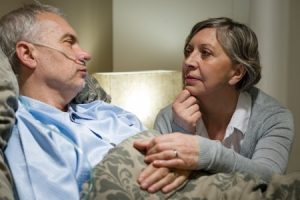 Laura Rickey, Class of 2017
Laura Rickey, Class of 2017
The University of Akron/NOAC
First, I would like to share the story that inspired me to write about this topic. Dr. Kristina English shared it with me after a hearing screening. The story is as follows:
A family had been given the news that their grandmother’s illness had received every available treatment, and it was now time to think about keeping her comfortable in respite care. The patient had been a hearing aid user in the past but while managing several recent emergencies, the family realized the hearing aids were lost. Now that the grandmother’s pain was under control, she wanted to talk to every one of her beloved family members — although she could talk, she couldn’t hear their responses. So the family found the audiologist who had fit the most recent set of hearing aids and asked for help. New hearing aids were quickly provided and the family made full use of them, sharing memories and stories, and laughter and tears with the grandmother for as long as she was able. The time did not last long, however, and she peacefully passed away 10 days later. The audiologist was contacted about her passing and also the memorial service. She told the family she would arrange for a refund, but they declined. They reported that they “got more than their money’s worth” in those 10 days, and they would rather have the audiologist hold on the devices for other families who could use the same kind of help. The audiologist followed their wishes, and has lent the devices to other families in the same end-of-life situation. The devices are lightly engraved with the words, “Use with Love.”
After hearing this extremely powerful story relating to the end of life and audiology, I decided to try and find out more about this topic. I came to find that there is very little information in the literature about the end of life and audiology. This came as a surprise to me, as audiologists serve a population with whom the end of life topic must be considered. This got me wondering if, as professionals concerned with communication, are we focusing most of our interests on early life, and possibly negating a very important part of life, that is death? In the book, Death and Dying, Life and Living, the ideal is shared that death is a very important part, if not one of the most important parts of individual’s life. There is absolutely no doubt that it is important to make sure that children receive auditory input as soon as possible, but are we focusing so much on this aspect of audiology, that we are forgetting about other times in life that communication is of the utmost importance? Is it possible that the first few moments, weeks or years are just as important as the last? Do audiologist have a place in end of life care? Is it ethical to recommend amplification at the end of and individual’s life? These are all questions that, in my opinion, need answers.
Do we Have a Place in End-of-Life Care?
According to the National Hospice and Palliative Care Organization (2011), hospice provides expert medical care, pain management, and emotional and spiritual support not only for the patient, but also for the patient’s loved ones. Hospice care involves an interdisciplinary team of specialists including; the patient’s primary physician, hospice physician or medical director, nurses, home health aides, social workers, bereavement counselors, clergy or other spiritual counselors, trained volunteers, and speech, physical, and occupational therapists, if necessary. Audiologists are not currently listed as interdisciplinary team members for hospice and palliative care, but should we be?
According to the National Institute on Deafness and Other Communication Disorders (2014), almost 25% of those 65-74 years old and 50% of those who are 75 and older have disabling hearing loss. Among adults 70 years and older with hearing loss who could benefit from hearing aids, fewer than 30% have ever used them. Even fewer (about 16%) adults 20-69 years old who could benefit from wearing hearing aids have ever used them. It is well known in the field of audiology that many people will never seek out treatment for their hearing loss. It can therefore be assumed that there are many individuals in the United States dying with untreated hearing loss. Additionally, audiologists often serve populations whom may have other major health concerns such as cancer. Now, ideally, we would treat all of our patients before the end of their lives, as we know all of the benefits to doing so. However, there will always be people that do not receive treatment. So, if these individuals end up in a hospice or palliative care situation, could we treat them and is it important that we do so?
End-of-life care is designed neither to hasten nor prolong life, but to keep the patient as comfortable as possible while providing psychological care for both the patient and their loved ones. As in the story above, the end of someone’s life is a time not only important to the person who is passing, but also very important for the family and friends of that individual. Pain management is certainly a very needed aspect in palliative care and, if able, patients should communicate with health care professionals and take an active role in the decisions that are made, but the psychological, social, and spiritual support should never be overlooked. A large part of the psychological, social and spiritual care may include communication between the patient and their loved ones, their spiritual advisors, and their care providers. If a patient with hearing loss is having difficulty communicating, are they being provided with the proper support at this critical time of need? I believe that the answer to that question is no!
Is it Ethical to Recommend Amplification?
Some may wonder if it is ethical to recommend amplification to an individual at the end of their life. The question should not be when is it ethical to recommend amplification to a patient who is nearing death. The question should be, when is it not ethical? If a patient would benefit from amplification, we should recommend it. Often, practicality takes over our minds in a situation such as this. Automatically, one assumes that spending a large sum of money on amplification wouldn’t make much sense if an individual will only use the device(s) for a few months or even a few weeks or days. Practicality is not always a factor when someone is near the end of his or her life as in the story above. The patient only used the hearing aids for 10 days and the family felt that they had gotten more than their money’s worth in that amount of time. There is and always will be vast individual differences among patients. A clinician cannot know how important amplification is to one patient in their final moments.
If amplification is suspected to be appropriate, quick action should take place in the form of a hearing assessment and hearing aid/ amplification device selection so that the individual may have access to communication as soon as possible. It is important to give the patient a whole range of options including personal amplification devices, which the patient may be more comfortable with. I believe that a simple device, such as a pocket talker should always be tried in these situations, because that may be enough to help, and if not, it can be used in the interim of receiving other amplification.
A Need for Open Discussion on End-of-Life and Audiology
As I previously mentioned, there is very little in the literature about audiology and end-of life-care, yet we serve a population of patients that will be experiencing end-of-life situations. Often, it is not even our patients who are experiencing end-of-life situations, but there loved ones. When they mention this to you, do you feel that you have an appropriate response? With an aging population, it is more important than ever that we start discussing this topic.
It starts with education! In the field of audiology students and professionals alike need to be comfortable with the topic of death and education is the key to this. In mainstream American culture, we value youth and tend to avoid the topic of death, however, if we want to be included in the interdisciplinary team of hospice and palliative care, we need to start talking openly about where we fit in.
References
National Hospice and Palliative Care Organization (2011). NHPCO Facts and Figures: Hospice care in america. Retrieved from: http://www.nhpco.org/sites/default/files/public/Statistics_Research/2011_Facts_Figures.pdf
National Institute on Deafness and Other Communication Disorders (2014). Quick Statistics. Retrieved from: http://www.nidcd.nih.gov/health/statistics/pages/quick.aspx
